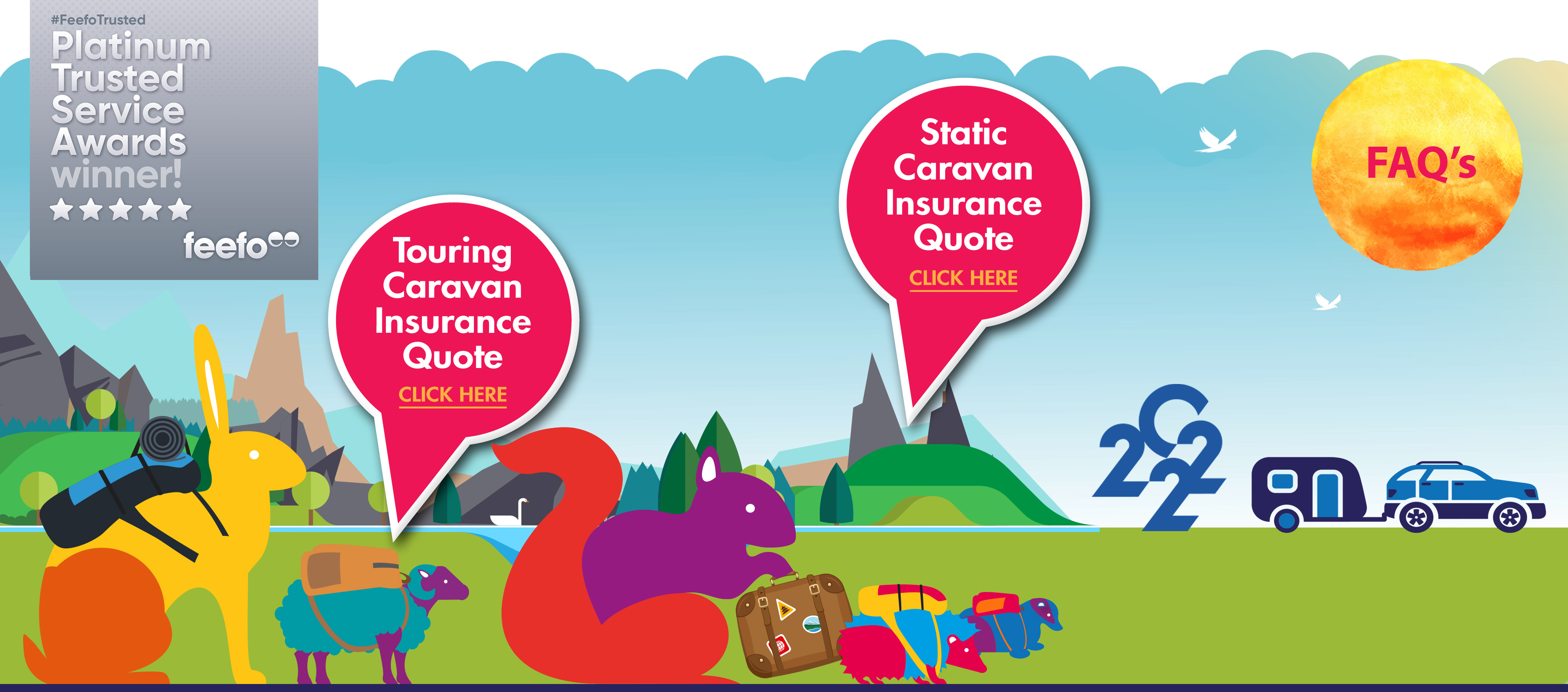Updated July 2024
Introduction
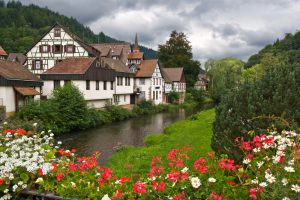 Why take your touring caravan to Germany? From the many contrasting landscapes, to its diverse cultures and central place in European history, the reasons are not hard to discover. This brief guide is intended to set out just a few of them.
Why take your touring caravan to Germany? From the many contrasting landscapes, to its diverse cultures and central place in European history, the reasons are not hard to discover. This brief guide is intended to set out just a few of them.
A brief history
Over the centuries, its borders have changed often, swelling and reducing the boundaries of modern Germany. But throughout that history, the country has remained at the very heart of Europe. To a very great extent, it is the historical and cultural heart of a Europe. Germany is in Western and Central Europe, with Denmark bordering to the north, Poland and the Czech Republic to the east, Austria to the southeast, Switzerland to the south-southwest, France, Luxembourg and Belgium lie to the west, and the Netherlands to the northwest.
Known as the “father of Europe” emperor Charlemagne laid the foundations for the so called Holy Roman Empire, which had most of Europe including what is now Germany at its centre. Until it was dissolved in 1806, the Holy Roman Empire (later named the Holy Roman Empire of the German Nation) was the largest empire western Europe has ever seen.
But you don’t need to be a dyed in the wool history buff to appreciate all the Germany has to offer for a touring caravan holiday.
Places to see
The country covers very nearly 140,000 square miles in area and shares borders with no fewer than nine of its neighbours – so you may be sure to find rich and diverse regional variations in everything from history, culture, landscapes, food and drink and even music.
Historic cities, the sandy beaches of the north and the dark forests of the south, the majestic charm of the Rhine Valley and vast stretches of open countryside, there is so much to see and do when you tour Germany with your caravan in tow.
With your own home away from home right behind you, and with some of Europe’s best campsites at your beck and call, you are never stuck for somewhere to stay – even if that means somewhere to sleep it off after sampling the wares of many a beer festival, local wine tasting, or exploration of the fiery mysteries of schnapps.
Like all good adventures, though, any tour of Germany is likely to benefit from a certain amount of planning – a time to savour the excitement of anticipation for what lies ahead.
This guide is intended to kick-start some of those preparations by suggesting some ideas about:
Contents
It is then all up to you to take to the open road and strike into the very heart of Europe – as it was and as it is today.
What you need before you go
Admittedly, some of the preparation for your great adventure might appear less exciting – but is no less important for all of that. There is a certain amount of paperwork which needs to be put in order, for example, and which you must remember to take with you, as well as ensuring that you and your caravan are going to be travelling safely, and with little risk of breakdowns:
Documentation
Please note that the information is correct at the time of writing. Please visit the Gov.UK site for the latest information.
Passports
- there is still freedom of movement for British visitors to Europe and you are unlikely to be held up by border controls as you make your way across the continent;
- passports are necessary, however, both for your own peace of mind and for an authoritative proof of identity as when you need it;
Driving licence
- your British driving licence is valid throughout the European Union, including Germany, of course;
- driving licence categories are the same, so you need to make sure that you are qualified to tow a caravan whose size and weight is within the limits permitted by your own licence;
Insurance
- just as in the UK, you need a minimum of third party insurance to drive the car, and this extends to third party cover for the caravan itself – but you need to make sure that your insurance cover provides the necessary protection for driving in Europe;
- to safeguard your trailer against theft, loss and damage, however, purpose designed touring caravan insurance is important – and here at Cover4Caravans, we make it our business to ensure that you have suitable insurance for any touring trip to Germany and all of our policies offer free continental cover for between 240 days in any one year;
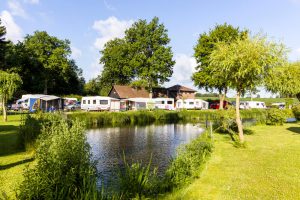 Preparing your caravan
Preparing your caravan
- if you are going to be some way away from home, it is clearly important for your caravan to be well maintained and its safety carefully checked;
- for a major tour – such as that to Germany – it is probably best not to make this the first of the season, but to have had at least one or two outings at home in the UK;
- no matter how many trial runs you may have made, however, it is important to run through a checklist of safety aspects before you set out:
- thoroughly check the tyres for any sign of bulging, cracking or wear and that they are inflated to the recommended pressure – the last thing you need is a blow-out whilst you are rattling down the autobahn;
- check the cooker by turning on and lighting each of the rings to make sure there are no blockages and ensure that the gas cylinders are as full as ferry companies or the Channel Tunnel operator allows;
- you may also need to carry certain equipment on board when driving through France, Belgium and in to Germany – the AA has produced some useful information;
- with safety first in mind, check all your security equipment, from alarms and locks to smoke detectors, intruder alarms and your first aid kit;
- before setting off, make sure that all the wheel bolts are properly tightened – especially if it has been a while since you last used the caravan;
- turn off the gas supply at the cylinder;
- empty any on-board toilet and flush tanks;
- secure anything that might move or shift around the caravan when you are underway and lock any wardrobes, stowage compartments and cupboards – including the fridge;
- when you are on the move, keep windows and roof vents firmly closed;
- check the caravan’s road lighting and signalling system;
- ensure that the jockey wheel is correctly raised and secured, with a breakaway cable connected in the correct manner; and
- check that the caravan is not overloaded and that its nose weight is within the manufacturer’s recommended limits.
With all these checks complete, you are ready to let off the handbrake and hit the road.
Getting there
Since Germany – or at least the parts most visitors want to get to – is largely landlocked, your principal options are likely to be the cross-Channel routes to France and to Belgium:
“Le Shuttle” (Eurotunnel)
- thanks to the tunnel, crossing the English Channel is no longer the obstacle it once was;
- the route takes you from Folkestone to Calais and takes only around 35 minutes – and once you arrive in Calais, the onward journey to, say, Cologne in Germany, is around 250 miles and likely to take around five hours;
- join the cross-Channel shuttle at Folkestone by taking the M20 motorway and exit at Junction 11 (for Cheriton and Folkestone);
- if you are taking a caravan on the shuttle, you travel in one of the single-deck carriages – which have twice the headroom of the double-deckers – and access is easier thanks to a much wider boarding area;
- as with any vehicle crossing, you stay inside your car – and this might make things easier if you are taking your pet with you. Further reading: Caravanning with your Pets
- vehicles that run on LPG fuel are not allowed on Le Shuttle, but the LPG you use for heating, refrigeration and cooking in your caravan may be carried in tanks with a capacity of up to 47kg, provided they are less than 80% full – and the LPG supply must be turned off for the duration of the crossing;
Ferries
- once again, the shortest, and therefore the fastest, cross-Channel route by sea is Dover to Calais – and lasts about an hour and a half;
- alternative French ports are Newhaven to Dieppe – a crossing time of around four hours, followed by a six-hour drive to, say, Cologne (so an overnight stay in France or Belgium is almost certain to be needed;
- a more direct route via France is offered by the Calais to Dunkirk sailing, which takes around two hours, followed by a drive of about three and a half hours to the German city of Cologne;
- if you are travelling from the north of England, a sailing between Newcastle and Amsterdam may be ideal – the sailing is overnight (chance for a mini-cruise?) although the driving time from Amsterdam to Cologne is only three hours or so.
There are short routes and there are longer mini-cruises that might launch your touring caravan holiday in Germany. Your choice, of course, is likely to be decided by your point of departure and your eventual destination in Germany.
Destination ideas
Germany is such a large country and has so many diverse and varied attractions that choosing a destination or touring route for your first visit may be overwhelming. Even seasoned visitors to the country are likely to find it difficult where to choose next.
The following, therefore, are offered as just a few destination ideas:
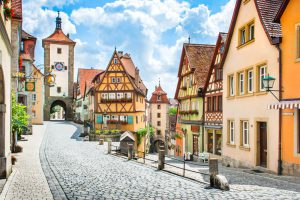 The Romantic Road
The Romantic Road
- this has to be one of the most popular tourist routes in Germany – and for very good reason, given its length and the diversity of landscapes and cities through which you will pass;
- starting in the city of Wurzburg in southern Germany, the route heads some 220 miles south to Bavaria and Baden-Württemberg;
- near the start are the historic cities of Würzburg and Augsburg and these are followed by three medieval walled towns – Nordlingen, Dinkelsbuhl and Rothenburg ob der Tauber;
- rounding off this particular tourist route is one of the most iconic sights in southern Germany, the stunning fairy tale castle of Neuschwanstein and the Bavarian Alps;
- near the beginning of the route is the appropriately named Camping Romantische Strasse, at Creglingen;
- just to the north of the city of Augsburg, you will find Donau-Lech Camping Site, which is also recommended by the Camping Club;
- Camping Brunnen is somewhere you’re likely to want to linger – it is towards the end of the Romantic Road, in the Allgau region of Bavaria;
- the caravan park is attractively situated on the shores of Lake Forggensee, backed by the Allgau Alps and only a short drive from Neuschwanstein and Hohenschwangau castles;
Harz Mountains
- the fairy tale land of the Harz Mountains is yet another favourite tourist destination – and with equally good reason;
- they cover a wide area of some 100 km (62 miles) long and 30 km (almost 19 miles) wide, covering the three north German states of Lower Saxony, Saxony-Anhalt and Thuringia;
- this is a stunning and mysterious landscape of mountains, deep gorges, alpine forests, tucked-away caves, waterfalls and lakes;
- if you want to stay in the very heart of the Harz Mountains – within a UNESCO Cultural Heritage site (the Upper Harz Water System) – make for Camping Prahljust, which is open for touring caravans the whole year round;
- in the Upper Harz Mountain Range, at an elevation of almost 1,400 feet, is Camping Okertalsperre, on the shores of a reservoir and close to the mountain village of Altenau;
- higher still – at some 1,800 feet is Campingplatz Am Bärenbache – near the town of Hohegeiß, which the site’s owners describe as the “sunny side” of the Harz Mountains;
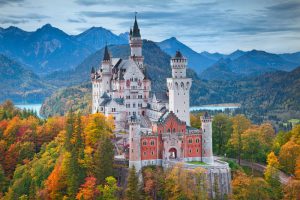 Bavarian Tyrol
Bavarian Tyrol
- if it is soaring peaks and stunning alpine scenery you are after, try a tour of the Bavarian Tyrol, which forms the border between this southern German state and Austria;
- this is a walkers’ paradise, with some of the best views and attractions accessible only on foot – such as Schachen castle, for example;
- as your base for a holiday in this part of Germany, you might want to choose somewhere near the town of Garmisch- Partenkirchen;
- fitting this bill to a tee is the caravan site Alpencamp, which is right alongside the mountain cable car at Garmisch;
- nestled between the mountains of Karwendel and Wetterstein, and in the lee of the mighty Zugspitze, is Alpen-Caravanpark Tennsee – a purposefully family-oriented site for those who enjoy the open-air life;
- still in the Bavarian Alps, but at slightly lower altitude is Campingpark Oberammergau – a town made famous for its passion plays;
The Baltic Coast
- Germany is certainly less well known – and an unlikely favourite – for beach holidays;
- the coastline stretches from the borders with Denmark and with Poland – the eastern part of which was known as the German Riviera, and has long sandy beaches;
- there is a very small tidal range and the sea off most of the beaches is very shallow, making a holiday here an ideal destination for caravaners with children;
- for the grown-ups, some of the old towns and cities bear witness to their wealthy Hanseatic past and are well worth the visit;
- if you are looking for mile upon mile of sandy beaches, backed by the shelter of the dunes, you might want to pitch up at the relatively small, but family oriented Camping in Neuhaus, just to the north of Rostock;
- if you prefer a caravan park set back from the sea (but still only a 20-minute drive away), you might want to stay at Campingplatz Schwaan, a wooded area in the County of Mecklenburg;
- right on the beach in the western part of this area, between the Hanseatic City of Wismar and the Baltic Sea Resort of Boltenhagen, lies Campingplatz Liebeslaube;
Black Forest
- you’ve probably tasted the gateaux, now experience a walk in the Black Forest;
- the forest is Germany’s largest nature park and – according to the local tourism office – is host to more than 250 holiday destinations;
- known in German as the Schwartzwald, the forest takes its name from the dark canopy of mostly evergreen trees which line the hills and valleys of this part of Bavaria, which stretches from the historic spa town of Baden-Baden to the Swiss border;
- to enter the forest is to step back into the fairy tale of Hansel and Gretel;
- in the southern part of the Black Forest, near the city of Freiburg on Lake Constance, is Camping Kirchzarten;
- if you are in search of some of the timeless chic of Baden-Baden, the nearby caravan site of Freizeitcenter Oberrhein might be the place for you.
Summary
With only a cursory glance at some of the possible destinations for a touring holiday in Germany, it is clear that the country offers a wealth of places to visit, history to absorb and scenery to appreciate.
All these suggestions apart, that still leaves many places in between for you to explore and enjoy.
Further reading: Taking your Tourer to Germany

